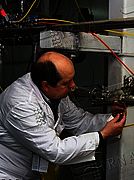Enrichment Suspended; Khamenei is Silent
» As Implementation of the Geneva Accord Begins
Even though as one member of Iran’s parliament quoted the country’s supreme leader as being dissatisfied with the interim accord reached between Iran and the 6 world powers in Geneva on November 24, 2013, ayatollah Khamenei made absolutely no reference to this in his most recent public speech last Sunday. And as Iran has started to suspend 20 percent uranium enrichment in the presence of IAEA inspectors, it is reported that the European Union will be lifting some of its sanctions against Tehran.
As the implementation of the November 24 Geneva accord began, ayatollah Khamenei who was speaking on the occasion of the birthday of Prophet Mohammad made no reference to the nuclear issue at all and preferred to focus on and criticize those who had disagreed with the Prophet.
This reticence comes despite the fact that last week an audio file attributed to Javad Karimi Ghodoosi, a former Revolutionary Guard general and current principlist member of the parliament, was posted in blogosphere in which it is claimed that the supreme leader was in no way happy with the Geneva accord. According to this MP, in a meeting with the three heads of government ayatollah Khamenei had said, “The right of the Iranian people to enrichment is not present in the text (i.e., the Geneva interim accord). This agreement has many ambiguities and the reason is that the negotiations team did not insist on preserving nuclear rights.”
According to the Geneva accord, the Islamic republic is committed to suspend its 20 percent uranium enrichment program while continuing its up-to 5 percent enrichment activities without expanding its nuclear sites. Also, the activities of the Arak heavy water nuclear facility are to be suspended and in return the West would be lifting some of its sanctions against Iran. The accord is to be tested for six months.
In the audio file, the representative from the city of Mashhad relates ayatollah Khamenei’s displeasure with the Geneva accord in these words: “In that meeting, the supreme leader said, one of the problems of this agreement is that you have conditioned every step to America’s agreement while America entered this discussion with specific plans.”
Sources close to Iran’s supreme leader have not confirmed the assertions that Ghodoosi makes in this audio file but there has never been an incident when a Majlis representative attributed completely false statement to the supreme leader, and on an issue as important as the nuclear program.
During a talk on November 4th last year, ayatollah Khamenei strongly supported the Rouhani administration’s negotiations team led by Javad Zarif and till today has not publicly criticized the Geneva agreement. The day after the supreme leader wrote a note expressing satisfaction with Rouhani’s report on the November 24 nuclear accord, the head of Iran’s Atomic Energy Organization said that the text of the agreement had been reviewed by ayatollah Khamenei before it was concluded in Geneva.
In recent weeks, some principlist representatives in the Majlis have been exerting pressure on Rouhani’s administration over the Geneva agreement, even though the head of the Majlis, and the head of the national security committee of the Majlis remain unswerving supporters of the accord.
Fears of Rouhani’s Secrecy
Still, there seems to be a lack of coordination in the national security committee of the Majlis in responding to Rouhani’s nuclear diplomacy. Ibrahim AghaMohammadi, a member of the committee, told Tasnim news agency (affiliated to the Revolutionary Guards), “We fear of secrecy by Iran’s negotiations team over the nuclear issue and the agreement that has been reached with the P5+1 states.”
Under these circumstances, in recent one or two weeks, rumors have spread within the higher circles of the regime that there were plans to create a monitoring or supervisory team over the nuclear negotiations team. There were also talks to returning the nuclear dossier to Iran’s national Security Council from the foreign ministry. Observers have said that the recent MP criticism and the hardline media disapprovals of the Geneva accord, including the publication of the recent audio file of a talk by Ghodoosi, are efforts to weaken Rouhani administration’s role in the next round of talks, even though there is no direct or undeniable evidence of Khamenei’s displeasure with the talks or the Geneva accord.
Reduce the Security Dimension of the Nuclear Dossier
The site Diplomacy Irani , belonging to former foreign minister Sadegh Kharazi, quotes a former deputy foreign minister GholamAli Khoshroo to have written that the security aspects of the nuclear dossier should be reduced. “Iran’s nuclear issue has gradually turned from a technical and legal issue to a political and security one. This is a technical and legal issue and so it must viewed in that context. It is detrimental for the country if the issue takes on a political and security dimension, which unfortunately is what has already happened.”
European Sanctions
The representative of the IAEA on Iranian nuclear issues is in Tehran, with his team to prepare to conclude the implementation terms of the Geneva agreement. In the meantime, Radio Farda broadcast an interview it had with Ms Ashton’s spokesperson who said that Europe would be taking steps to remove some of the sanctions after it receives a report from the IAEA.
Under existing plans, talks between Zarif and Ashton to reach the final agreement will start with preliminary talks in mid February; talks that observers believe will bring forth greater pressure from hardliners in Tehran and Washington aimed at failing the process.

